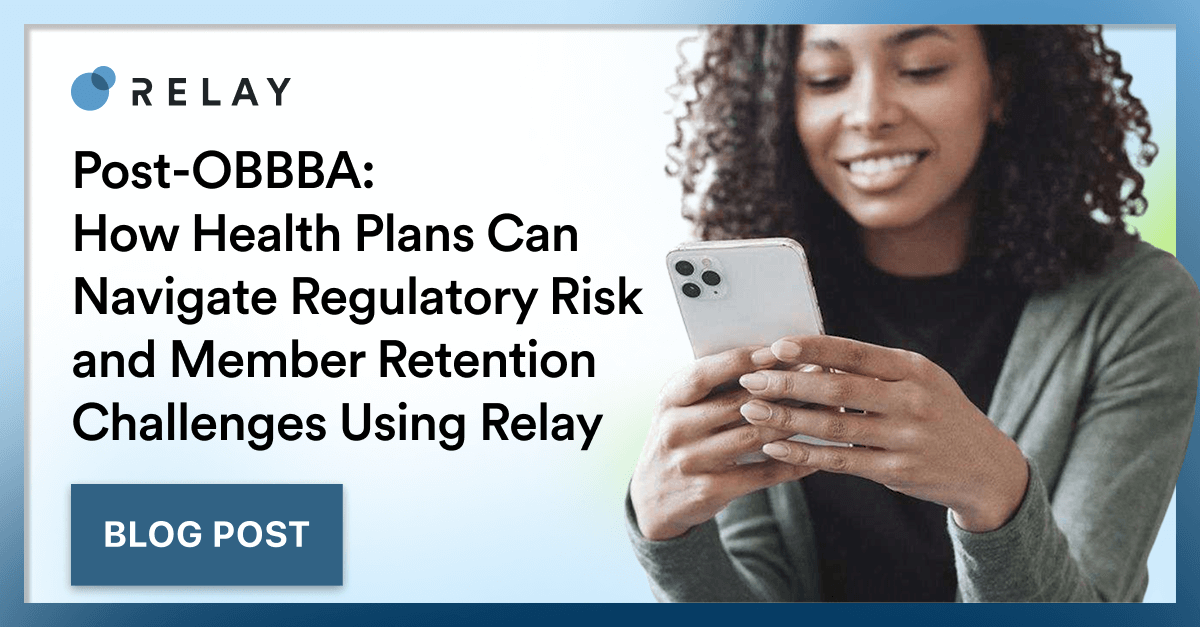
Blog
Post-OBBBA: How Health Plans Can Navigate Regulatory Risk and Member Retention Challenges Using Relay
The OBBBA law is reshaping healthcare across the country, creating urgent new challenges and high stakes for healthcare organizations, especially those supporting Medicare and Medicaid members. From bi-annual redeterminations to stricter cost-sharing and engagement requirements, the ability to reach and retain vulnerable members just got a lot harder.
Here, we will break down some of the key concerns that our health payer clients have voiced with the upcoming changes and regulations and how Relay can support – and has already demonstrated success – reaching and engaging these harder-to-reach and more vulnerable populations.
Redetermination Changes
Let’s start with Medicaid. There are major changes affecting the Medicaid space that have implications for the MCOs that support that population. First, OBBBA has cut federal spending on Medicaid and CHIP benefits by over a trillion, leading to the possibility of millions of Medicaid members losing their coverage. And as part of the new regulations, OBBBA requires Medicaid redeterminations every six months for members starting in 2026. If plans can’t reach members and ensure timely action, coverage loss, and churn, becomes a likely outcome. For plans, this raises the risk of compliance penalties, increased support costs, and downstream care gaps.
It is vital for payers to communicate the new eligibility requirements to their members to mitigate any risk of losing coverage solely due to procedural reasons. After the Medicaid unwinding in 2023, one Medicaid MCO using Relay saw 81% of members click to renew through redetermination messages—achieving the highest renewal rates in their state post-PHE. By reaching out to these populations early and often with this critical information, payers and MCOs have an opportunity to retain Medicaid members at a higher rate.
Increasing Premiums and Prior Authorization Requirements
Similarly, there are changes to Medicare as a result of OBBBA, both impacting traditional Medicare and Medicare Advantage members. For traditional Medicare, some services will require prior authorizations in some states, but coverage will likely remain the same. For Medicare Advantage members, they may have increases in premiums and copays while also seeing a reduction in supplemental benefits like vision and dental which could lead to plan switching and loss of revenue for these plans.
Proactive education reduces support center strain and helps members understand the value of their coverage, even with higher premiums, before they consider switching. Education and transparency are key to maintaining member trust and retaining members.
Relay has found that across our healthcare clients, our highest engaging population are those who are 65 and older. We see an average 21% click through rate and 25% action rate on Relay messages. Relay’s stats prove that our channel is an effective way to reach and engage with this population, especially on timely and relevant topics, like premium and benefits changes.
Expiring Tax Credits
As for the individual and ACA markets, members are already hearing about the enhanced federal tax credits that are set to expire at the end of the year. These tax credits were initially put in place to help offset some of the costs of individual insurance so that plans remained affordable for members who were on them. With tax credits set to expire, millions could face premium increases of $500–$800 or more. This cost increase could lead to 4-5 million Americans losing coverage and churning. And for payers, member loss equates to revenue loss.
Relay helps plans alert members early, educate them on lower-cost options, and retain them before Open Enrollment begins and they start looking for other options. One client saw a 38% click-through rate on Relay messages addressing upcoming premium shifts.
How Relay Helps Health Plans Stay Ahead of OBBBA
At Relay, we have proven success with these harder-to-reach populations through our mobile-first content delivery channel, the Relay Feed. The Relay Feed combines the power and reach of SMS with the familiarity and ease-of-use of a scrolling feed. In fact, more than 2.4 million Medicaid members and 3 million Medicare members are receiving communications via Relay Feeds and converting on important actions using the channel.
Relay is the most trusted channel for urgently reaching the most vulnerable and hard-to-reach members with critical messages. Here is where we see the most impact:
- Reach and Retain At-Risk Members
Relay’s SMS + scrolling feed technology delivers critical messages directly to members’ mobile devices—no apps or logins required.
・2x engagement on redetermination messages within hours
・81% of members clicked to renew via Feed reminders
- Reduce Outreach Costs—Fast
Relay lowers operational spend by consolidating outreach into a single, scalable digital channel.
・20% average reduction in direct mail and call center volume
・Spanish language feed, real-time chat, and dynamic forms built-in
- Guide Members to the Right Coverage and Care
Relay’s Smart Actions personalize each journey based on member behavior—automatically.
・Promote plan transitions for ACA-eligible members
・Educate Medicare Advantage members on changes before dissatisfaction builds
Health plans face rising pressure to retain coverage, cut costs, and improve quality—all while navigating regulatory change. Relay makes this possible by turning communication into action.
Proven. Fast to deploy. Built for Medicaid, Medicare, and ACA. Now’s the time to act—before redetermination and benefit changes become revenue losses.
If you would like to experience a Relay Feed for yourself, use the link below to get a feed sent to your phone.
To learn more about how Relay can support your team in their redetermination efforts, reach out to sales@relaynetwork.com.
Read more about Relay’s success with redetermination: